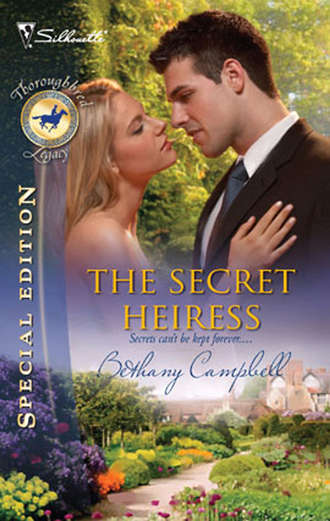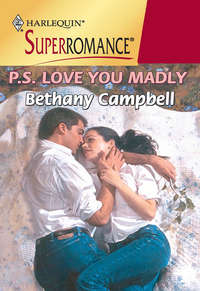
Полная версия
The Secret Heiress
“I make my base with him in Hunter Valley,” Andrew said. “But I won’t be there much. Have to travel a lot. Excuse me. I see somebody I have to talk to. Nice to meet you.”
He nodded, a curt movement that signaled goodbye. He turned his back on the woman and left her looking piqued.
Maybe he was being paranoid, but that might be good. No involvement with women—especially one like that—until the election was over. That was that, and it should be gospel.
But suddenly he remembered his strange attraction to the blond waitress. He wondered why he couldn’t forget her. Biology could toss even the most cautious man a curveball.
He was more cautious than most because he had to be. He pushed the blonde to the back of his highly efficient mind.
Almost.
But there was another woman, only a memory now, a lively voice that sometimes spoke to him that no one heard except him.
He gazed up at the night. Darwin’s cloudy sky showed an obscured, gray pearlized moon. Suddenly the voice in his memory, that long-ago woman’s voice, said “There’s a door in the moon—if you can find it. And if you open it, you find out the future.”
For an instant, he saw the past instead, and another young woman, small and spirited like the waitress. Kellie Maguire.
He’d met her his first year at the University of Kentucky. When she’d told him about the door in the moon, at first he thought she was nuts or trying to grab attention. No. She meant it. He finally asked if she’d ever found the door into the moon.
She’d laughed and said she’d never looked for the future; she was too busy with the present. And she was.
She wasn’t like anybody he’d ever known before. She had a sassy air about her and long red hair, always tied back in an unruly ponytail. She was sweet and cheery and as independent as hell.
Unlike him, she didn’t come from a family with money. She was a scholarship student, majoring in art and literature. He thought that was stupid. How could anybody make money that way?
She laughed good-naturedly at his business major. How was he ever going to have fun if he didn’t learn anything except money? “Hey, Preston,” she teased. “Live, why don’t you?”
She didn’t give a damn for fashion, and she was so original and self-disciplined he was in awe of her. He’d only seen her cry once, when she’d learned her grandmother was dying. She broke down in tears for almost a full minute, and he’d held her. Then she’d pulled herself together and tried to act as if nothing had happened. She’d never spoken again of that moment.
He was secretly shy and, though he hated to admit it, hide-bound. She challenged him, she fascinated him, she could get him talking half the night about things he’d never even thought of before.
She enticed him to movies he never would have seen on his own, challenged him to read books he normally never would have opened. She’d changed him, and by the end of his freshman year, he was falling in love with her, unconventional as she was.
And then she was gone. Forever. A swimming accident over the summer. A drunken motorboater didn’t see her, and ran into her, killing her almost instantly. And Andrew hadn’t come close to loving anyone again since.
Now, for that strange instant, the door in the moon opened, and he saw her standing there, with a smile and her untidy red hair dancing in the cloudy breeze.
“Christ, Preston,” she said in his mind. “Now you want to be president of ITRF?”
That question raised a dozen more in his heart.
“Yeah,” he said to her silently. “Very funny, huh? I want to be president…”
“Then go for it,” she answered with her sidelong grin. “But is that all you want? Are you sure? Isn’t there something missing?”
And then her image disappeared, and he was staring up at a clouded, doorless moon.
At midnight that night, Jacko Bullock reached across the sleeping body of his mistress and picked up the receiver. “What?” he demanded. He was in a rotten mood because he’d just dozed off, but he hadn’t quite managed to make love to Tarita, who now slept beside him, all silken and exquisite and useless. He needed a new woman again.
He heard raspy breathing, and that meant Feeney. Feeney was his contact, his liaison in Jacko’s covert war on Andrew Preston. Feeney was a general in this war, one whose face he’d never seen, but who’d been supplied by very dependable allies.
Jacko had a public campaign for president of the ICRF. And he also had an extremely well-hidden private one, as complex as a huge spiderweb. Feeney wasn’t at its center, but he was close enough, close enough.
“Preston steered clear of her,” said a man’s rasping voice. “The dark one. She said he smiled, he nodded. But he didn’t let her get near him.”
Jacko swore. “What is he, a pansy? Sylvia’s gorgeous.”
Hell, he thought, she’d kept him satisfied for almost three months—that’s how good she was. He’d sent orders for her to wear something red and low-cut. And plenty of diamonds. He’d given her diamonds. Cheap ones, but they’d kept her happy.
“He’s not a pansy,” Feeney said. “He likes women, all right. I think he just was leery of her. Maybe she’s not his type.”
Jacko swore again. “Not his type? She’s the type for any man with a set of working goolies. For a while, at least.”
“Well,” Feeney said hesitantly, “she’s not subtle, y’ know? From what we know, he doesn’t go for the glam thing. No super-models. His tastes are hard to predict.”
If Sylvia’d got Preston in bed, I’d’ve given her good diamonds, Jacko thought.
He stared down at Tarita’s lovely, sleeping form and wondered if she’d suit the Yank. If she could turn the trick, he’d give her up in a minute.
“Preston’s human,” said Feeney in his scratchy voice. “This country’s full of beautiful women, and he’s a long time here. And he isn’t made of iron.”
Jacko snorted. “Then watch him. When he finds a piece, she’s dead meat, by God. And he’ll be done. Ruined.”
“He’s being watched,” said Feeney. “He’s being—”
Jacko, disgusted that the bejeweled Sylvia had failed, hung up. He stared down at Tarita, shadowy on the wine-red satin sheet. Should he shake her out of sleep and try again?
No. He was too tired, too disgusted. God, he wished this election were over and he could get on with his life. So much more lay ahead: more power, more prestige—and far more money.
He hoped Feeney was right, and Preston would hurry up and find himself a tasty tart. And then? God help the scumbag. And the unlucky dirty little girl he settled on.
Feeney would help him take care of that, too.
The next morning in Darwin, Marie still moved like an automaton. And like an automaton, she did not feel. She was numb and vaguely wondered if she was in shock.
She managed to get through the day because Colette would have wanted her to.
Reynard arrived late that evening, before Marie got home from Scepter. He’d parked his battered blue truck in front of her apartment and waited in the driver’s seat. As soon as he saw Marie, he leaped out of the truck to hug her tightly.
She clung to him with real affection. He’d always been kind to her and Colette, and Colette had adored him. Even though she fretted over him, he could always make her laugh with a funny story or a cheeky song.
“My little love,” he said against Marie’s ear. “Our Colie’s gone where there’s no more pain. Had she been born my blood sister, I couldn’t have loved her more.”
Marie drew back and studied his face, shadowy in the apartment’s outdoor lights. He was in his early sixties, but still surprisingly handsome. The only apparent flaw in his health was that he wore two hearing aids. He’d suffered for years from ringing in his ears, and had begun to go deaf in his late thirties.
He was tall, and his body was straight and strong. He had dark blond hair, wavy and going gray. His brows were darker, his lashes bronze-colored and surprisingly long.
In spite of the lashes, his face was strong-boned and years of sunburn had lined his skin, especially with laugh lines. His eyes were medium blue and looked lazy, heavy-lidded. They made him seem as if he was ready to nod off, but she knew his gaze missed little.
She looked up at him. “I’m glad you’re here. Nobody else would understand.”
He rumpled her short hair. “I know. We’re an odd lot, aren’t we? Tell me, duck, when’s the service? I’ll have to go to the Salvos and get me a suit.”
Marie looked him in the eye. “There’s no service. She was cremated yesterday. That’s how she wanted it. We can get the ashes tomorrow. She wanted them scattered in the ocean.”
Reynard’s body stiffened, and he stared down at her with displeasure. “Cremated? Burned like rubbish?”
“She never told you. She knew you wouldn’t like it.”
“You did it without me?”
“She didn’t want you to have to be there. She thought it…would hurt.”
“And what about you, miss? You were there all by yourself?”
She swallowed hard, not wanting to remember. “Yes. I didn’t want her to be alone.”
He shook his head in what seemed a mixture of dismay and grudging admiration. “But you were alone. Didn’t you feel wretched?”
“I didn’t feel much of anything,” she said honestly. “Rennie, it’s like an invisible suit of armor fell from the sky and clamped itself on me. It won’t let me feel yet.”
“Ah. I know the sensation.” He looped his arm around her shoulders. “Maybe now that I’m here, you can come back to yourself. Let’s go inside.”
As she unlocked the door, he said, jokingly, “I hope you’ve got a drop of something for you old uncle. The long drive made me thirsty.”
She nodded sadly. “I bought a bottle of port.”
“Then let’s have a glass. It’ll loosen you up. Your body feels tight as a knot, my girl. You should come back to Hunter Valley with me. Get away from this place for a while.”
He was steering her into the living room, but she stopped and stared at him in alarm. “I can’t leave here,” she protested. “I have classes. I have a job. I have this apartment.”
“Details,” he said with a careless air. “I have a proposition for you.”
“What?” she asked suspiciously.
He gave her his most winning smile. “We’ll talk about it tomorrow. After…you know. Now let us drink a toast to our Colie. And that old bat Louisa. Who might be your granny.”
She could no longer think clearly. She didn’t want to think at all about Louisa Fairchild, only Colette. “Yes,” she said. “A toast. She deserves that.”
Marie had reserved a small hire boat. Reynard, of course, could pilot it, for he truly was a jack-of-all-trades. After her classes the next day, they took the boat out into the harbor to a pretty and private spot that Colette had always loved.
They said their own silent goodbyes and released the ashes into the waves. Then they returned to shore. And nothing, to Marie, would ever be the same.
Afterward, she and Reynard sat in a pub near the harbor. Reynard had a whiskey, but Marie barely touched her wine.
“Oh, knock it back,” Reynard urged her. “You’ve been through bloody hell, my girl. Drink a bit more. It’ll help you to sleep.”
“Sleep?” she asked dubiously.
“I’ll drive us back, and you should take a nap,” he said. “You look all fagged out. You’re not Superwoman, y’know.”
She saw the logic, but still she didn’t want the wine.
“You remember what I said last night?” Reynard asked. “About you coming back to Hunter Valley with me?”
“Remember what I said? I have commitments here.”
“Perhaps you have commitments there,” he argued. “To your mother, for instance.”
“Mama?” she asked, puzzled.
“Yes,” he said, leaning closer, staring intently at her. “She gave you the letter from Willadene Gates, didn’t she? She expected you to deal with it. Knew she didn’t have the strength to do it herself, poor thing. Wanted to know the truth. Knew the end was near, I’ll warrant. Thought it was time to put things in your hands. Trusted you, she did.”
“She didn’t know if anything should be done,” Marie objected.
“She kept the letter, didn’t she?” he challenged. “She gave it to you, didn’t she? Read her note. She practically begs you. She thought she failed you by not following through. But that you could handle it. And so handle it you must.”
Marie felt a bit dizzied by his reasoning. “What difference does it make if Mama was Louisa Fairchild’s daughter? I mean, it can’t mean anything now that Mama’s—”
She found it hard to say the word dead.
Reynard looked both saddened and angry. “If the Fairchild woman had been kinder, Colie might not be dead. Years of poverty ground her down. But Fairchild just cast out Colie and let the fates take her. God, I’d show a dog more kindness.”
“Rennie, she probably thought that Mama was going to a good, safe home. Mama loved the Lafayettes. Didn’t you?”
“I was a mere toddler when they lost everything. I don’t remember the good times. No, I’ve no happy childhood memories. They couldn’t even afford to get my ears fixed. My life might’ve run a different course if that had happened.”
Colette would agree to this, Marie knew. Reynard said that he did poorly in school because of his tinnitus, the constant ringing in his ears. He was bright, but he knew he’d never get through college, so never tried.
Instead he’d drifted across Australia, back and forth, up and down. He’d lived that way for decades, and Colette had always feared he’d die that way, aimless, rambling and poor.
Marie looked at him in concern. He raised his chin and said, “I think you owe it to her to find out about the old Fairchild girl. And who knows? Maybe you could put things to right.”
“To right?” she repeated, frowning slightly.
“Maybe Louisa was forced to give away her baby and that’s why she’s so sour. You could bring her happiness. And find some yourself. Colette would want that for you. You know she would.
“Besides,” he added, “the old girl might settle a bit of money on you. God knows you and Colie never had help from any corner.”
“I don’t want that woman’s money,” Marie said firmly. “I can take care of myself.”
Reynard shrugged. “I wish I could say the same. If she was my gran, I’d feel her out. She might at least give me enough for better hearing aids. Why, there’s even doctors in England and America that say they can cure tinnitus.” He smiled philosophically. “But I’ve borne it this long, haven’t I? I can bear it for the few more years I’ve got.”
The few more years I’ve got. The words struck Marie hard. When she was young, she thought Colette would live forever. And Rennie, vital, mischievous, clever Rennie—why, if he could live by his wits, he’d never have to die. But he was aging. And mortal.
“It seems to me,” he said, “if she’s your gran, you might close a long, sad chapter in your family history. Bring about a sort of healing. A sort of—fairness. And forgiveness.”
Marie could say nothing.
“What do you say? Come back with me,” he urged. “It would do you good to get away for a while. You’ve worked yourself half to death with your school and your job and caring for Colie. Will you think about it at least? For me?”
Her head swam, and she felt emotionally exhausted. “I’ll think about it,” she said without conviction.
“Good girl,” he said with a disarming smile. He patted her hand. “Good girl.”
The next morning Reynard kept after her. He had an answer for her every argument. Perhaps Louisa would have helped Colette and her family—if only she’d known what had become of her daughter.
What was wrong with going to Fairchild Acres, just to see if Marie might like the old girl? “You could work there, you know. Observe her. She lost an assistant cook right before I left for here. You’d be the perfect replacement.”
“Go in as a spy?” Marie demanded, appalled. “And if I like her, pop up and say, ‘And by the way, I’m your long-lost granddaughter?’ No! It’s awful. It’d never work.”
Reynard then explained for a full hour why it would work. “Again, if you don’t like her, she never needs to know. You can leave and never look back.”
“I have to take my finals.”
“Take them early. You’ve got fine grades. Tell ’em your mother’s died and you’ve got family business to tend.”
“I have a job.”
“Colette said they think the world of you. They’d give you a leave of absence. Your apartment? Sublet it. It’s an excellent location, the uni so close.”
“I can’t.”
“You can’t not do it. It may be the chance of your lifetime.”
“I don’t want to talk about it. I’ve got to get ready for work.”
“Work, that’s all you ever do. You’ll end up like your mother. And she’d hate that.”
He made her head spin. She was glad to escape to the Scepter.
When she came home again, Reynard was watching television. He switched it off with the remote control. “Sit down with me,” he said. “I got news.”
Now what? she thought. But she sat. “Yes?”
“I phoned Mrs. Lipton,” he said with his most benevolent smile.
“And who, pray tell, is Mrs. Lipton?”
“Louisa Fairchild’s housekeeper. Lovely woman. I see her almost every day.”
“Why do you see her so often?” asked Marie. “And why’d you phone her?”
“I bring her eggs. The old girl—Miss Fairchild—likes her eggs fresh, but she won’t keep chickens. Afraid of birds. Was chased by a goose as a child.”
This was the first humanizing detail Marie had heard about the woman.
“I called Mrs. Lipton to ask if she was still in search of an assistant cook. She is.”
“Reynard…” Marie said in a warning tone.
“She’d found nobody suitable yet. So I told her about you, that you have your certificate in cookery and hospitality from the uni, that you work at the Scepter, that your mum was a cook, too, and she taught you to make wonderful desserts and pastries. She said you sounded perfect.”
“Reynard,” she exclaimed in shock. “How could you?”
“I told her you need a change of place with your mum just dead and all. So tomorrow just e-mail her some references or whatever. I didn’t tell her you were workin’ on a second certificate. Didn’t want you to sound overqualified. I told her it’d take you about two weeks to make arrangements to leave here. She said fine.”
She stood, torn between laughing or exploding in anger. “No. And that’s an end to it.”
That was not an end to it. He argued, he cajoled, he flattered, insisted, urged, coaxed, wheedled, pleaded and finally goaded. It was when he called her a coward that she snapped.
“You’re afraid,” he taunted. “You’ve never had an adventure in your life. I defy you to name a single one. You’re a lovely young woman, but you’re becoming a drudge. Now adventure comes knocking, and you pretend you’re not at home.”
Marie, sad, exhausted, worn down, finally agreed. She went to bed, wondering if she’d gone insane.
Reynard had to go back to Hunter Valley, and Marie, still filled with doubt, scurried to put her affairs in order. Always efficient, she’d finished her arrangements in just over a week.
Two days after he got back to Lochlain, Reynard phoned to say there’d been a spot of trouble at his employer’s, a stable fire, but not to be alarmed by anything she heard on the news; the fire had been contained. Nobody had been seriously hurt. All was well.
Marie, who had no time to follow current news, took him at his word and told him she’d see him soon. “I can’t believe I’m doing this, but I’m buying my bus ticket today.”
“No you’re not,” Reynard told her. “I got you a plane ticket to Newcastle. It’s only a skip and jump from there to Fairchild Acres. I’ll meet you at the airport.”
His generosity stunned her. He couldn’t afford such a gesture. “Reynard, you can’t. That’s too much money. I can’t allow it.”
“The ticket’s in the mail, duck. And like a duck, my duck, you will fly. Think of it not as a gift for you, but for Colie. It’d make her happy.”
She bit her lip so that she wouldn’t cry. “Thank you, Rennie. I’ll pay you back some day.”
“You’ll pay me back by coming here. And that’s your gift for Colie. To find out the truth about her and Louisa Fairchild.”
PART TWO
Hunter Valley, New South Wales
March
Chapter Four
On a morning in early March, Marie found herself in a cramped economy seat on the cheapest airline out of Darwin. It was small and a bit shabby, but she was thrilled, for she’d never before been on a plane.
The inside of it looked no more glamorous than an elderly bus, but it was a magical thing, for it quickly whisked her up into the clouds and in an unbelievably short time, she was hundreds of kilometers away, in the Newcastle, New South Wales, airport, hugging Reynard.
He flinched at her tight embrace, and when she kissed his cheek, her lips touched a long cut just starting to heal. “Oof.” He drew back from her slightly, and she realized that under his work shirt she could feel something suspiciously like bandages.
“Rennie, what’s wrong?” she demanded.
“Oh, the bloody fire,” he said dismissively. “Cracked a few ribs, that’s all. Don’t worry, love. I’m a tough old bird, I am.”
Instantly she suspected his injury—and the fire—had been more serious than he’d let on. “Reynard, tell me more about this whole thing. Were you in the hospital?”
“Only overnight. Come on. Let’s go find your luggage. Ah, it’s lovely you look. Flying agrees with you?”
“It was wonderful,” she answered. “But I want to know more about what happened to you. And about the fire.”
As he steered her toward the baggage claim area, she saw that he carried himself gingerly and walked with a slight limp. “Rennie,” she prodded, “what happened?”
“A horse panicked, rammed me against a wall,” he told her. “That’s all. The scratch? The wall had a nail in it. And for a few seconds, so did I. A bit of a bashing, nothing life-threatening, I assure you.”
“And the fire? How bad was it?”
Gruffly he explained that in terms of money, the fire was a disaster for Lochlain Racing, where he worked for Tyler Preston. Several horses had died, and many more had been permanently damaged by smoke inhalation. There was one human fatality, a body that had finally been identified as old Sam Whittleson.
“Sam Whittleson?” Marie echoed in disbelief. “That man Louisa shot?”
“The very one. Somebody killed him this time. They found a gun half-melted in a burned fertilizer barrel, and a lab’s trying to identify it. The cops say the fire was arson, and—”
“Wait,” Marie interrupted. “Arson? Murder? You told me nobody was seriously hurt.”
“When we talked, I didn’t think anybody was,” Reynard said defensively.
“Who killed him? Why?”
“Nobody knows,” Reynard said with an impatient shrug. “Anyway, the authorities said the fire was set, and some yobs whisper Tyler Preston himself set it. To hide that he was drugging his horses.
“But,” Reynard said flatly, “he didn’t drug horses, and he set no fire. That’s the trouble living in the sticks. Too much gossip, too many rumors. Now, take Louisa Fairchild. Some even say she done Sam in—ridiculous. An eighty-year-old woman steals out in the wee hours. She lures a man who wouldn’t trust her for a second into a neighbor’s barn? And she guns him down? Not bloody likely.”
The luggage carousel buzzed, and suitcases began to cascade onto the moving belt. Her bicycle appeared with a clatter. “God’s holy trousers,” Reynard exclaimed. “You brought that bloody old wreck of a bike?”
“I have to get around. I don’t have a car.”
“You’ll frighten horses,” he grumbled. “Nobody rides a bike up there. You ride something with four wheels or four legs, and that’s it.”
“I’m not afraid to be different,” she countered, lifting her chin.
He shook his head. “You never were. And I don’t know if that’s your blessing or your curse. Indeed I don’t.”










